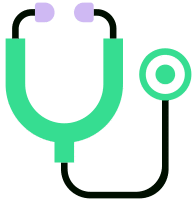A few weeks ago I was searching on Google: What is— and the first question that came up was “What is CBD and does it really work?”
So here we are, I figured with stress and tension a constant in most people’s lives, CBD is going to be one of the options people are turning to. And I, like everyone else, need answers.
What is CBD?
CBD (cannabidiol) is a therapeutic compound produced by cannabis. It is commonly extracted and processed into oils, gummies, topicals, and other products that have no doubt sparked your curiosity. And with curiosity comes a load of questions.
Cannabinoids are a class of compounds that interact with receptors throughout your body. CBD is just one of dozens of cannabinoids found in cannabis, including tetrahydrocannabinol (THC), which is the one responsible for marijuana’s famous high. Medical cannabis is technically any cannabis product used for medicinal purposes, and these can contain THC or CBD or both, said Nick Jikomes, a neuroscientist at Leafly, a website that provides information about legal cannabis. “A common mistake people make is to think that CBD is ‘the medical cannabinoid’ and THC is ‘the recreational cannabinoid.’” That’s inaccurate, he said, because THC is a potent anti-inflammatory and can be helpful for pain.
How does it actually work?
Each of our bodies has a set of receptors that interacts with cannabis compounds called cannabinoids, like CBD. These receptors, found throughout the body, comprise the endocannabinoid system (ECS), a complex signaling system that ensures our bodies maintain homeostasis.
Put another way, the endocannabinoid system keeps us in balance by directing the communication traffic in our bodies. Cannabinoids such as CBD interact with this system, mimicking natural compounds (called endocannabinoids) produced by the body.
In the human body, CBD influences cannabinoid receptor activity and encourages production of the body’s natural endocannabinoids. Interestingly, CBD also affects activity beyond the endocannabinoid system and can also interact with opioid, dopamine, and serotonin receptors. The ability of CBD to interact with so many different systems throughout the body suggests it has the potential to open new frontiers in psychiatry and medicine.
Last year, the National Academies of Sciences, Engineering and Medicine released a nearly 500-page report on the health effects of cannabis and cannabinoids. A committee of 16 experts from a variety of scientific and medical fields analyzed the available evidence — more than 10,000 scientific abstracts in all. Because so few studies examine the effects of CBD on its own, the panel did not issue any findings about CBD specifically, but it did reach some conclusions about cannabis and cannabinoids more generally. The researchers determined that there is “conclusive or substantial evidence” supporting the use of cannabis or cannabinoids for chronic pain in adults, multiple sclerosis-related spasticity (a kind of stiffness and muscle spasms), and chemotherapy-induced nausea and vomiting. The committee also found “moderate” evidence that cannabis or cannabinoids can reduce sleep disturbances in people with obstructive sleep apnea, fibromyalgia, chronic pain and multiple sclerosis, as well as “limited” evidence that these substances can improve symptoms of Tourette’s syndrome, increase appetite and stem weight loss in people with HIV/AIDs, and improve symptoms of PTSD and anxiety.
What are some things to Consider when buying CBD?
Exactly where the CBD comes from is important, too. CBD products in the medical and adult-use cannabis markets come from plants bred for strong effects, aromas, and flavors. They often contain THC, cannabis’ main active ingredient, which causes euphoria. By contrast, hemp-derived CBD comes from industrial hemp plants consisting of less than 0.3% THC.
When talking about hemp, we’re referring to the low-resin industrial crop commonly used to make clothing, textiles, food, and other materials. And in this context, we’re using the word cannabis to describe the high-resin plants that are grown specifically for medical consumption or enjoyment.
Is one source better than the other? Here’s a glance at the pros and cons of each.
Hemp-derived CBD:
- Pro: Hemp is legal federally in the US (but check your local laws to ensure it’s legal in your state), and hemp-derived CBD products are widely available for purchase online and in grocery and drug stores.
- Pro: Hemp produces only trace levels of THC, making it appealing for consumers wanting to avoid THC altogether.
- Con: Hemp produces a limited spectrum of therapeutic compounds compared to high-resin cannabis.
- Con: Hemp products are currently unregulated, leaving unreliable potencies, dubious claims, and questionable ingredients unchecked.
Cannabis-derived CBD:
- Pro: Cannabis produces a wider spectrum of therapeutic compounds (and in greater abundance) compared to hemp.
- Pro: Cannabis-derived CBD products are strictly regulated and tested per state laws.
- Con: Cannabis-derived CBD is only available in states with legal cannabis, making it unavailable to consumers outside legal states.
Other important pieces of jargon include “full spectrum” and “broad spectrum,” versus “CBD isolate.”
- Full spectrum CBD includes trace levels of other cannabinoids and terpenes, including THC.
- Broad spectrum CBD includes trace levels of other cannabinoids and terpenes, but no THC.
- CBD isolate consists of nearly pure CBD crystals with no other cannabinoids and terpenes.
No overarching federal authority polices the use of these terms, unlike, for example, the USDA with the designation “organic.”
One red flag for a label: vague CBD sourcing or no mention of CBD at all. Watch out for “hemp extract” or “hemp oil.” By using these phrases, the manufacturer is deflecting any claim to deliver actual CBD. Amazon.com is loaded with low-quality “hemp oil” products that make medical claims but contain no CBD.
Other Ingredients
- Beyond raw CBD oil or CBD isolate, most CBD products are going to come with other ingredients. Gummies will commonly contain glycerin, colors, and flavors. Tinctures often come mixed with some other oil, spirits, or glycerin. Scrutinize other ingredients for quality, purity, and the presence of potential allergens.
Warning labels
- CBD has drug interactions and is not for everyone. Read and heed common sense warnings and disclaimers. It’s important to remember that CBD, like other nutraceuticals, can interact with medications. CBD isn’t effective in treating all types of pain—for that reason, it’s important to understand your pain: does it worsen with the weather, cause swelling, or is it persistent and stabbing? If you feel that you experience inflammatory or neuropathic pain, talk to your doctor. CBD supplementation could be right for you. For more information on potential harmful or helpful drug interactions please go to this link: https://www.leafly.com/news/health/cannabis-cannabinoids-drug-interactions
Certification
- A third-party certification attests to the accuracy of the manufacturer’s label claims. Testing for adult-use and medical cannabis is a legally mandated form of third-party certification. One popular type of third-party certification is a Certificate of Analysis (COA) from a cannabis testing lab. Lab quality varies, however. Beware of recycled, old COAs attached to current inventory.
What’s the right dose of CBD?
Your perfect CBD dose depends on a few different factors, including your individual biology, the delivery method, and the specific nature of your symptoms. There is no ideal, one-size-fits-all dose with CBD. Your perfect CBD dose depends on a few different factors, including your individual biology, the delivery method, and the specific nature of your symptoms. For example, high doses of CBD (upward of 600mg daily) seem to be more effective for conditions like epilepsy, whereas low doses are potentially effective for anxiety.
Research is beginning to show that there’s a sweet spot when it comes to dosing cannabinoids like CBD: Consume too much or too little, and you may feel limited relief or side effects. More research is needed to develop specific guidelines around CBD dosing for different medical conditions. Until then—if you’re using CBD oils, edibles, or other products to treat symptoms like anxiety, stress, pain, or insomnia—consider starting with a low dose of CBD (around 5mg) and slowly increasing until you’ve found the optimal dose for you.
For more information and the resources I used please visit these links:
https://www.leafly.com/news/cannabis-101/what-is-cbd
https://www.nap.edu/catalog/24625/the-health-effects-of-cannabis-and-cannabinoids-the-current-state
https://clinicaltrials.gov/ct2/results?cond=&term=Cannabidiol&cntry=&state=&city=&dist=



